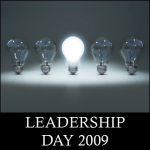
Educational Bloggers write about the need for Leadership for technology in education.
Today is Leadership Day, 2009.
You are a Leader. As a leader, what is your vision?
What is your vision for learning in the 21st Century? What does it mean to be a learner and an educator in 2009? What role will technology play in education in the years to come?
I’m sure you have your own understanding of what it means to be a leader. Whether your role is officially recognized as such, or whether you lead more from the sidelines, you are reading this because you care about what it means to demonstrate leadership in education. And regardless of whether you are in an officially recognized leadership role or not, you’ve probably been exposed to a number of models and theories that espouse what leadership looks like in schools.
But if we cut to the quick, there are some key competencies that most would agree are reflected in effective leadership:
- Leaders must make informed, sometimes difficult decisions.
- Leaders must continually listen, think, and engage with the various stakeholders (in education, we think of students, teachers, administrators, parents, community leaders, governments).
- Leaders must act as role models.
- Leaders must seek out and enable leadership in others.
- Leaders must be prepared to espouse a vision, and act as a champion in moving that vision forward.
Education changed in response to the Industrial Age. Education was re-vamped in response to the Space Age. And now, once again, education needs to be re-assessed in light of the Information Age.
There are many questions that beg to be answered when we take time to envision how learning, educating, and the role of schools will and must evolve in the coming months and years. You will no doubt have your own questions about how learning is changing.
I invite you to consider the following:
What is my vision for learning in my school? Managing a school and leading a school are not the same. When I think of what learning looks like in my school when everything is going well, what do I see? What are the learners doing? What are the educators doing? What are we doing this year that we weren’t doing before? Is this my vision, or is this someone else’s vision? Is it a shared vision?
How can I act to better enable learning for the children in my school? Being a learner today is not the same as being a student then. Ask yourself, do we need the children in our schools these days to be students, or do we need them to be active learners? What does this mean? What is my role in helping to support this distinction in our process? And what must we do differently to support better learning?
How can I act to better empower the educators in my school? The subject-matter-expert transmitting expertise to students is the old-school industrial model. Teachers today must extend their practice in response to the changing tide of information. How can I dialogue with my staff to help them collaborate in responding to the needs of the children who attend our school? Who can I support and who do I need to draw out? What can I do to support authentic Professional Learning Communities and Personal/Professional Learning Networks for my staff?
What role does technology play today in the lives of our students, and how are emerging technologies changing the nature of learning? The 2.0 Web and modern technologies cannot ‘end’ at 8:45 a.m. when school begins and ‘start up’ again at 3:30 p.m. when school lets out. How informed am I with regards to modern technologies and the role they will plan in transforming education? Who can I turn to to better understand what’s going on? What are our school and system short/long-term goals for making better use of these technologies to support learning?
What can I do as a leader to ensure that our students are responsibly cared for at school, while at the same time allowing them to engage in meaningful projects in the local and global community? Finding solutions to social and environmental issues of our day will require the active engagement of our leaders of the future, our children. How can we ensure that our learners are learning to engage in authentic problem solving opportunities? How can we help learners to develop their skills with the support of experts and co-learners from our community and other parts of the globe?
These are large questions, not easily answered in a single sitting. But they can be answered. A vision can be articulated. And then acted upon.
What is your vision?
I’ll be posting another part to this, looking to provide links to resources that might provoke some discussion. You can also check out the responses to Scott McLeod’s Leadership Day 2009 call — there’s bound to be a lot there!




